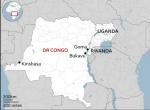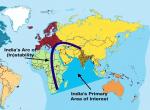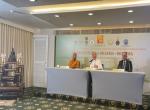Strategic
Wuhan adds 1,290 fatalities to coronavirus death toll
The Chinese city of Wuhan, ground zero for the coronavirus pandemic, has added more than a thousand deaths to its official count of lives lost to Covid-19. After checking online data against information gathered in person from hospitals, police stations, funeral homes and other sources, the city’s coronavirus response team added 1,290 new deaths to the tally, bringing the total to 3,869, it said in a statement on April 17. Patients who died at home without diagnosis in the early stages of the outbreak, hospitals left out of the online reporting system and overburdened institutions “failing to report or misinforming” authorities during the peak period led to undercounting, the Wuhan government said. Doubts about the official death count in Wuhan had intensified in recent weeks, as a gradual relaxation of the city’s lockdown led families to flood funeral homes to pick up the ashes of their relatives.
Trump’s Guidelines to Reopen Economy Put Onus on Governors
President Trump outlined broad new federal guidelines for opening up the country( read here ) that will put the onus on governors to decide how to restart the economies in their states amid mounting fallout from the coronavirus outbreak. The three-phase process encourages states to make data-based decisions. The guidelines do not suggest any reopening dates, and Trump acknowledged that it would be "a gradual process." To begin implementing the guidelines, states must first meet a "gating" criterion that includes a "downward trajectory of documented cases within a 14-day period" or a "downward trajectory of positive tests as a per cent of total tests within a 14-day period (flat or increasing volume of tests)," as well as hospital preparedness.
France’s Macron says he hopes to secure Putin backing for UN truce plea
French President Emmanuel Macron said he has secured the agreement of three of the five permanent members of the United Nations' Security Council to back a call by the UN for a global ceasefire so the world can focus on the fight against the pandemic caused by COVID-19. The UN's Secretary-General Antonio Guterres called for a global truce on March 23. Macron said that Chinese President Xi Jinping, US President Donald Trump and British Prime Minister Boris Johnson had all confirmed to him they would back the plea. The French leader said that he was hopeful of securing Russian President Vladimir Putin's agreement in the coming hours. “I think that for sure President Putin will agree and the day he says he does, we'll be able to hold this videoconference and relay this call in a solemn, forceful and efficient way. "The five veto-wielding powers - the US, China, France, Russia and Britain - have been discussing a French text for a draft resolution.
Coronavirus, expats and Ramadan stress test food security in Gulf
As the virus disrupts global supply chains, desert nations like the United Arab Emirates that import as much as 90% of the food their largely expatriate populations consume are treating the issue as a matter of national security. U.A.E. officials have eased import regulations, including requirements for Arabic labelling and extended best-before periods, lowered duties and crammed extra cargoes onto flights intended to repatriate citizens. Qatar responded to a boycott by four leading Arab nations that began in 2017 by ramping up its small domestic output, and says it’s self-sufficient in dairy and fresh chicken. Saudi Arabia produces enough milk and eggs to meet demand, according to the Saudi Embassy in the U.S., and exports to the Middle East. Riyadh has allocated $532 million to finance agricultural imports through loans to support food security during the pandemic, state news agency SPA reported April 15. Measures companies had requested for years were pushed through quickly. The potential for supply disruptions has stirred memories of the global food crisis in 2007.
Israel's President asks Parliament to choose Prime Minister
Israel's President has asked the Knesset to choose a new prime minister, giving the parliament three weeks to agree upon a leader or plunge the country into an unprecedented fourth consecutive election in just over a year. President Reuven Rivlin made the move after his prime minister-designate, former military chief Benny Gantz, and Prime Minister Benjamin Netanyahu failed to reach a power-sharing deal by a midnight deadline.Although the deadline passed, Netanyahu's Likud and Gantz's Blue and White party said they would continue their negotiations toward an "emergency" unity government meant to steer the country through the coronavirus crisis.The sides officially have three weeks to wrap up a deal. Otherwise, the Knesset would dissolve and trigger another election.
Tens of thousands of Pakistanis await repatriation flights
Some 35,000 people have registered with the Pakistani embassy in Abu Dhabi to return home. The Pakistani government has said its citizens who wish to do so will soon be brought back from countries such as the United Arab Emirates. But the speed in which the government is conducting its coronavirus response has drawn criticism both home and abroad.
Coronavirus: EU apologizes to Italy for initial response
In her opening remarks to the European Parliament on 16 April, European Commissioner Ursula von der Leyen repeated an apology to Italy on behalf of Europe for its failure to do more to help at the start of the pandemic. "It is true that no one was really ready for this. It is also true that too many were not there on time when Italy needed a helping hand at the very beginning," von der Leyen said. "And it is right, that Europe apologizes wholeheartedly for this." She said that, after a bad start, the EU has shown it is capable of solidarity. After the disappointing start, Europe's response was now the "most impressive in the world," she said. Von der Leyen said Europe needs a Marshall Plan to recover from the effects of COVID-19. “The European budget will be the mother ship of the recovery".
A nitty-gritty look at Germany's loosened coronavirus lockdown rules
Chancellor Angela Merkel has outlined plans for Germany's slow return to normal life amidst its coronavirus lockdown. These include allowing smaller shops to reopen, schools to re-start and a strong recommendation that people wear masks while shopping and on public transportation. The regulations end weeks of uncertainty for many businesses, teachers, and schoolchildren. Students preparing to leave secondary school are set to return to school first, on May 4, along with those leaving primary school. Beginning on April 20, non-essential and smaller shops, with an area of less than 800 square meters (8,610 square feet), will be allowed to reopen and stay open if they follow social distancing. However, the closure of bars, restaurants, and religious buildings will remain in place without a specified end date. Hair salons will be allowed to open on May 4 as long as stylists wear protective gear and customers are seated far apart. Physical distancing regulations, including a ban on gathering with more than one person outside of an individual's household, will remain in force until May 3.All businesses involved in major events, like soccer games and concerts, will likely have to wait even longer than bars and restaurants. Germany's ban on large gatherings will continue until at least August 31, Chancellor Merkel confirmed.
Japan PM Abe declares nationwide state of emergency amid virus spread
Japanese Prime Minister Shinzo Abe expanded the state of emergency beyond Tokyo, Osaka and five other prefectures to the entire nation on April 16, in an attempt to prevent the new coronavirus from spreading further and straining the health care system. With the declaration now covering all 47 prefectures in the country of around 126 million people, Abe said the government will provide cash handouts of 100,000 yen ($930) to all citizens. He also approved a rare reworking of a state budget days before its planned submission to parliament. The nationwide state of emergency will not lead to hard lockdowns but is certain to deal a debilitating blow to Japan's economy, already on the brink of recession following a consumption tax hike last year. Some governors had asked the central government to include their prefectures amid fears of growing infections.
Coronavirus: No ‘business as usual’ with China after pandemic, Britain says
Britain’s acting leader Dominic Raab said it could no longer be “business as usual” with China when the coronavirus pandemic is over, the latest sign of hardening attitudes toward Beijing as the crisis drags on. “There absolutely needs to be a very, very deep dive after the event and review of the lessons, including of the outbreak of the virus,” the foreign secretary said at a press conference in London on April 16. “I don’t think we can flinch from that at all.” France’s Macron meanwhile said there were grey areas in China’s handling of the coronavirus outbreak and that things “happened that we don’t know about”, speaking in an interview with the Financial Times published on April 16.
Trump faces G7 resistance to US plan to cut WHO funding
Trump's conversation with the leaders of Britain, Canada, France, Germany, Italy and Japan "centred on the lack of transparency and chronic mismanagement of the pandemic by the WHO" and the G-7 leaders called for a "thorough review and reform process," according to the White House. "There is a need for international coordination and the WHO is an important part of that collaboration and coordination," Trudeau said. German Chancellor Angela Merkel expressed her "full support" for the WHO and similar international groups, and stressed that it will take "a strong and coordinated international response" to defeat the pandemic. French President Emmanuel Macron expressed his support for the WHO and said the organization must play a "central role" as part of an "ambitious and coordinated international response" to the virus crisis. The Italian foreign ministry said it was committed to consolidating a global governance of health care "in which the WHO plays a crucial leadership role." Much of global criticism has argued that US cutting the WHO's funding in the middle of a pandemic made no sense and said there will be plenty of time after the virus is vanquished to review its actions.
Backing Trump, U.S. Republicans call for WHO chief to resign
Republican U.S. lawmakers echoed President Donald Trump’s criticism of the World Health Organization on April 16, with some suggesting he withhold aid until the U.N. agency’s director general resigns while others called for an international investigation of its handling of the coronavirus. Seventeen of Trump’s fellow Republicans on the House of Representatives Foreign Affairs Committee wrote a letter to Trump supporting his announcement this week that he was withholding funding for the WHO, and saying he should make the resumption of contributions conditional on the resignation of Director General Tedros Adhanom Ghebreyesus. In their letter, the House Republicans said they had lost faith in Tedros and blamed the WHO and Chinese Communist Party for the extent of the current global health crisis, although they praised the “vital role” the WHO plays around the world. “However, it is imperative that we act swiftly to ensure the impartiality, transparency, and legitimacy of this valuable institution,” said the letter, led by Representative Mike McCaul, the committee’s ranking Republican.
Economic
China’s First-Quarter GDP Plunges on Coronavirus; Worst Quarter since 70s
China’s economy plummeted 6.8% in the first three months of the year compared with a year earlier, the country’s first such drop since Beijing began reporting quarterly gross domestic product in 1992. The sharp contraction in the world’s second-largest economy, reported on April 17, offers a foreshadowing of the pain expected in the U.S. and around the world as the coronavirus pandemic shuts borders, halts business activity and cripples global supply chains.
‘Grave concerns’ about Covid-19 immunity passports
Trapped between the competing urgencies of saving lives from Covid-19 and avoiding economic calamity, some government officials have mooted “immunity passports” as a way through the impasse. UK’s Health Secretary Matt Hancock announced in early April that the British government was considering an “immunity certificate” system to allow those who qualify to “get back as much as possible to normal life”. On the other side of the Atlantic, Anthony Fauci, the director of the US National Institute of Allergy and Infectious Diseases, told CNN that immunity passports are “being discussed” in the Trump administration. “It might actually have some merit under some circumstances,” he added. But experts have mentioned that the necessary antibody testing is not reliable enough – and even if the scheme were feasible, it could create a dangerous incentive for some to acquire the virus in order to qualify for the passport. There may be cross-reactivity between the antibodies for SARS-CoV-2 [Covid-19] and other circulating coronaviruses – including those that cause common colds –leading to false positives on such tests.
HNA in chaos as internal divisions erupt in public
China’s HNA Group that just three years ago was China’s largest buyer of overseas assets, has said it is walking a fine line between life and death, as internal conflicts at the heavily indebted conglomerate burst into the public sphere.In an unsigned letter published online on April 16, the airline-to-insurance business criticised its own finance department for its handling of an investor meeting that prompted a suspension of trading in HNA’s debt.The statement underlined the conglomerate’s growing credit problems — which have been compounded by coronavirus — and factional rifts that have hurt its operations since the sudden death of a top executive two years ago. It was unclear why the internal conflict had been made public. But the statement suggested friction between its recently appointed executive chairman, Gu Gang, and HNA’s finance department.A senior Chinese government executive, Mr Gu joined the company in February to manage severe liquidity risks at HNA as a result of the coronavirus crisis.
EU trade chief urges tougher defences against foreign takeovers
The EU’s trade commissioner has urged countries to toughen their vetting of foreign takeover bids, warning that the coronavirus pandemic had left the bloc’s “strategic assets” vulnerable to acquisition from abroad. Phil Hogan encouraged trade ministers on April 16 to cooperate in screening merger bids, saying that Brussels was ready to take on a central role in coordinating monitoring and information sharing. “Economic vulnerability could result in a sell-off of critical infrastructure or technologies,” he warned. “Remember, the acquisition of a company in your country may have a security effect in other member states or it may negatively affect a project of union interest,” Mr Hogan told a videoconference of the EU's trade council. Ministers also backed plans to prolong a version of the EU’s temporary restrictions on exports of personal protective equipment to countries outside of the bloc.
Khan Academy founder: Balance between in-person, online learning could be ‘silver lining’ of crisis
The forced closure of schools around the world due to the coronavirus pandemic could create a better balance between online and in-person learning going forward, Khan Academy founder Salman Khan said on April 16. “Even when we didn’t have school closures, their value was if I’m a teacher in a class with 30 students, how do I cater to their individual needs? ... So I’m hoping that as we come out of this the silver lining will be we will understand how to leverage both in the best possible ways,” Khan continued. Roughly 1.4 billion children around the world have seen their schools closed due to the pandemic, according to the World Health Organization. Khan, whose non-profit is supported by the Bill and Melinda Gates Foundation, said physically going to school is still important for students due to the socialization benefits.
U.S. opposes general allocation of Special Drawing Rights to IMF members
The United States opposes creation of liquidity through issuance of the International Monetary Fund’s Special Drawing Rights (SDRs) as part of the response to the coronavirus pandemic, U.S. Treasury Secretary Steven Mnuchin said on April 16. In a statement to the IMF’s steering committee, Mnuchin said 70% of the funds created through an SDR allocation, something akin to a central bank “printing” new money, would go to G20 countries that did not need it, while only 3% would go to low-income countries. Instead, he said, members should contribute to two IMF facilities that provide funds to the poorest countries, and the U.S. government was exploring such a contribution itself. Indian Finance Minister Sitharaman too in a statement to the IMF’s steering committee said that she was concerned that such a major liquidity injection could produce potentially costly side-effects if countries used the funds for “extraneous” purposes. “In the current context of illiquidity and flights to cash, the efficacy of an SDR allocation is not certain, she said, adding that most countries rely on national reserves as a first line of defence.
Gold retreats on optimism over U.S. plans to restart economy: Indian demand at lowest in 3 decades
Gold prices fell on April 17 as optimism over initial plans to reopen the U.S. economy lifted risk appetite, but heightened worries over the worst recession in decades kept bullion on track for its second straight weekly rise.Spot gold eased 0.8% to $1,704.52 per ounce by 0346 GMT. The metal was up about 0.9% for the week so far. The U.S. gold futures slipped 0.7% to $1,719.80 per ounce. While there is a “temporal mismatch” between the financial markets and the real economy, the reopening of the U.S. economy is suggesting a recovery may come a lot quicker than expected, in turn weighing on gold, said Stephen Innes, chief market strategist at financial services firm AxiCorp. India’s gold consumption in 2020 could fall as much as 50% from a year ago to the lowest level in nearly three decades as a nationwide lockdown has closed jewellery stores during key festivals and the wedding season. The drop in consumption by the world’s second-biggest gold buyer could limit a rally in global prices, which hit a more than seven-year high earlier this month. The fall in demand could also narrow India’s trade deficit and support the faltering rupee.
Egypt expects tourism revenues to drop by $5 billion due to coronavirus
Egypt’s tourism revenues in the current fiscal year are expected to reach $11 billion instead of the earlier expected $16 billion, Minister of Planning Hala El-Said was quoted by Ahram. “The current global outbreak of coronavirus has led to a near halt in the tourism and aviation sectors in Egypt,” El-Said said.The minister added that she expects some growth rate recovery in the second half of the upcoming fiscal year during a press conference at the Central Agency for Public Mobilization and Statistics (CAPMAS) headquarters in Cairo to review the implications of the coronavirus on the economy in Egypt and elsewhere. The Egyptian tourism sector is one of the country’s main sources of foreign currency, and in 2019 reached revenues of $13 billion, according to Ahram.
Scale of Eurozone recession is hard to predict, says Lagarde
The president of the European Central Bank has said it is “extremely difficult” to know how long the Eurozone will be stuck in recession or how deep the downturn will be, as fresh data exposed the sudden loss of business confidence and dynamism in the bloc’s economy. Christine Lagarde said in a statement to the IMF’s virtual meeting on April 16 that the Eurozone was heading for “a large contraction in output” and “rapidly deteriorating labour markets” because of the coronavirus pandemic. Inflation was expected to continue falling from its already low levels in the short term, she added, adding that the medium term outlook for prices was “surrounded by high uncertainty”. “Uncertainty is sharply elevated and will remain high, making it extremely difficult to predict the likely extent and duration of the imminent recession and subsequent recovery,” said Ms Lagarde. The IMF predicted this week that the Eurozone economy would shrink by 7.5 per cent this year — the deepest recession the bloc has ever suffered — before partly recovering with growth of 4.7 per cent next year.
Medical
The 4 stages of coronavirus treatment – from oxygen therapy to ‘last resort’ lung bypass machine
For Covid-19 patients admitted to a hospital, medics carry out a number of checks and tests before deciding on possible treatment options.In addition to a coronavirus test, one of the most important checks involves measuring blood oxygen levels. Doctors work through a series of four stages, starting with the least invasive and gradually building as needed, according to the Telegraph.For those who develop mild symptoms of coronavirus, the advice is to stay at home and self-isolate for at least a week. First is Basic Oxygen Therapy to get coronavirus patients who have become breathless will be struggling to get enough oxygen into their blood. The next stage is to give the patients pressurized oxygen therapy. Doctors will also be monitoring their vital signs more closely. If the patient is still having difficulty breathing and not getting enough oxygen into their blood, medics will consider putting them on a ventilator in ICU. In some patients, their lungs can become too damaged and inflamed for a mechanical ventilator to adequately get enough oxygen into the bloodstream. The ECMO machine is similar to the heart-lung bypass machine used for open heart surgery and works by bypassing the lungs to infuse the blood with oxygen.
For Further Reading:
- Financial Times: Wuhan adds 1,290 fatalities to coronavirus death toll, https://www.ft.com/content/6bfcaa02-4227-3155-85c2-7e7c658ff725
- Wall Street Journal: Trump’s Guidelines to Reopen Economy Put Onus on Governors, https://www.wsj.com/articles/trump-set-to-unveil-guidelines-for-lifting-coronavirus-restrictions-11587050541?mod=hp_lead_pos3
- Global Times: France’s Macron says he hopes to secure Putin backing for UN truce plea, https://www.globaltimes.cn/content/1185715.shtml
- Al Jazeera: Coronavirus, expats and Ramadan stress test food security in Gulf, https://www.aljazeera.com/ajimpact/coronavirus-expats-ramadan-stress-test-food-security-gulf-200416125510611.html
- Al Jazeera: Israel's President asks Parliament to choose Prime Minister, https://www.aljazeera.com/news/2020/04/israel-deadlock-netanyahu-gantz-unity-deal-deadline-200416062210211.html
- Al Jazeera: Tens of thousands of Pakistanis await repatriation flights, https://www.aljazeera.com/news/2020/04/tens-thousands-pakistanis-await-repatriation-flights-200416112053354.html
- Deutsche Welle: Coronavirus: EU apologizes to Italy for initial response, https://www.dw.com/en/coronavirus-eu-apologizes-to-italy-for-initial-response/a-53142603
- Deutsche Welle: A nitty-gritty look at Germany's loosened coronavirus lockdown rules, https://www.dw.com/en/a-nitty-gritty-look-at-germanys-loosened-coronavirus-lockdown-rules/a-53149361
- Mainichi: Japan PM Abe declares nationwide state of emergency amid virus spread, https://mainichi.jp/english/articles/20200416/p2g/00m/0na/085000c
- SCMP: Coronavirus: No ‘business as usual’ with China after pandemic, Britain says, https://www.scmp.com/news/world/europe/article/3080304/coronavirus-no-business-usual-china-after-pandemic-britain-says
- Mainichi: Trump faces global resistance to US plan to cut WHO funding, https://mainichi.jp/english/articles/20200417/p2g/00m/0in/025000c
- Reuters: Backing Trump, U.S. Republicans call for WHO chief to resign, https://in.reuters.com/article/health-coronavirus-who-congress/backing-trump-u-s-republicans-call-for-who-chief-to-resign-idINKBN21Z07M
- Wall Street Journal: China’s First-Quarter GDP Plunges on Coronavirus, https://www.wsj.com/articles/china-set-to-report-plunge-in-first-quarter-gdp-11587086697?mod=hp_lead_pos1
- France 24: ‘Grave concerns’ about Covid-19 immunity passports, https://www.france24.com/en/20200416-grave-concerns-about-covid-19-immunity-passports
- Financial Times: HNA in chaos as internal divisions erupt in public, https://www.ft.com/content/ef752046-871a-4a1d-a3b4-c47fb8f98c7b
- Financial Times: EU trade chief urges tougher defences against foreign takeovers, https://www.ft.com/content/bf83fa94-1bcf-4532-a75a-50f41351c0d4
- CNBC: Khan Academy founder: Balance between in-person, online learning could be ‘silver lining’ of crisis, https://www.cnbc.com/2020/04/16/khan-academy-founder-online-learning-could-be-silver-lining-of-crisis.html
- Reuters: U.S. opposes general allocation of Special Drawing Rights to IMF members, https://in.reuters.com/article/imf-worldbank-usa/u-s-opposes-general-allocation-of-special-drawing-rights-to-imf-members-idINKCN21Y1UP
- Firstpost: IMF liquidity boost may have costly side effects, says NirmalaSitharaman; opposes new SDR allocation, https://www.firstpost.com/business/imf-liquidity-boost-may-have-costly-side-effects-says-nirmala-sitharaman-opposes-new-sdr-allocation-8269181.html
- Reuters: Gold retreats on optimism over U.S. plans to restart economy, https://in.reuters.com/article/global-precious/gold-retreats-on-optimism-over-u-s-plans-to-restart-economy-idINKBN21Z086
- Arab News: Egypt expects tourism revenues to drop by $5 billion due to coronavirus, https://www.arabnews.com/node/1658771/business-economy
- Financial Times: Scale of Eurozone recession is hard to predict, says Lagarde, https://www.ft.com/content/18e46a79-14cb-42e4-b3ee-317e0462ebf0
- The Sun: The 4 stages of coronavirus treatment – from oxygen therapy to ‘last resort’ lung bypass machine, https://www.thesun.co.uk/news/11353221/4-stages-coronavirus-treatment-hospital/
Image Source: https://cdn.cnn.com/cnnnext/dam/assets/200406162949-coronavirus-origins-exlarge-169.jpg











Post new comment